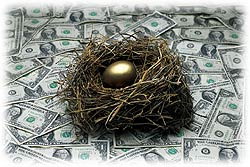Fri 8 Jun 2007
Future Pleasure or Immediate delight? Have your pick…
Posted by Robin Bal under Financial Planning , Investing , LifeStyle , MoneyMatters , Personal Finance[2] Comments
 If you ask children to choose between eating one ice cream immediately or two ice creams a day later, they’ll invariably choose to have just one right away. But if you give the child a choice between one ice cream the next day or two ice creams the day after that, almost all children will choose to wait the extra day and get two ice creams instead of one. I think all parents know this. I too figured this out almost as soon as my daughter was old enough to ask for things. Of course, children are pretty clever and often manage to outmaneuver parents. But whether it works or not, parents know that the trick is to try and avoid situations where a choice has to make between immediate gratification and some future pleasure.
If you ask children to choose between eating one ice cream immediately or two ice creams a day later, they’ll invariably choose to have just one right away. But if you give the child a choice between one ice cream the next day or two ice creams the day after that, almost all children will choose to wait the extra day and get two ice creams instead of one. I think all parents know this. I too figured this out almost as soon as my daughter was old enough to ask for things. Of course, children are pretty clever and often manage to outmaneuver parents. But whether it works or not, parents know that the trick is to try and avoid situations where a choice has to make between immediate gratification and some future pleasure.
Unlike parents, economists took a long time to figure this out and when they finally did, it was thought to be a great discovery. But then, applied to economic behavior, it probably is. What is true about the way our children make ice cream decisions is also true about the way we make decisions about savings, investments, and expenditures and probably about many non-financial matters like health and work too. Most of us, children or adults, are not good at making decisions that involve comparing the seductive present (and the immediate short-term) with the distant future.
Of course, this is not equally true of everyone. Some people, especially at a young age, have a severe form of this problem of not being able to think past the immediate gratification. These are the people who supply much of the profits of credit card issuers. At the other extreme are the kind of people who spend their lives accused of being misers- the ones who are unable to live the present without obsessively planning for the future. For a long time, the difference between the two kinds was considered to be a sort of moral gap with the former being the thrifty and careless no-goods and the latter being sensible and prudent.
But perhaps this is not the right way of looking at things. Over the last three decades or so, there has been a lot of research that suggests that some of these behavior patterns are fundamental to the way the human brain has evolved. For most of the period during which human beings were evolving, the immediate present really was very important – much more so than the distant future.
The problem is that this instinctive preference produces financial behavior that is detrimental to our economic well being. Conventionally, the solution to this would be education and self-awareness. If more people learn about patterns of risky economic actions then they wouldn’t take those actions, right? Well, actually, it doesn’t look like it. Only a small proportion of people will have the self-awareness to modify their economic behavior and pay more attention to the long-term than the immediate short-term. The only way that people can change their behavior is if they somehow get committed into a good choice.
I’ve always said that it was important for investments to be liquid so that one could withdraw from them when the need arises. However, it is a fact that for a large mass of people, the main investments tend to be the ones like long term retirement funds where they are forced to make and stick to for a long period of time. Perhaps there’s a lesson there.











